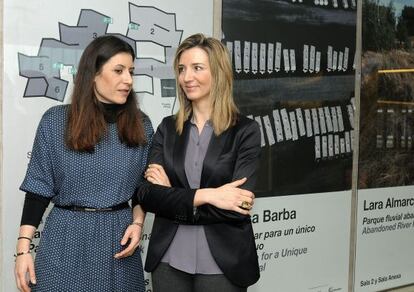Musac chief quits three months in
The director of the León contemporary art museum says she feels “deceived”

"I feel deceived and I feel like my hands are tied. I want the regional government of Castilla y León to rescind my contract because it did not fulfill its side of the bargain," says Eva González-Sancho to explain why she is stepping down from the helm of Musac, the region's contemporary art museum, after just three months.
Museum workers say that ever since her appointment, the regional government has been constantly interfering with management and programming. ADACE, the association of contemporary art museum directors, which brings together 35 professionals, has condemned the Castilla y León administration's conduct in an open letter to regional culture chief Alicia García, expressing "disagreement with the political decisions that resulted in this resignation and that unfortunately reflect a kind of behavior that has yet to be eliminated from this country's political practices."
Manuel Olveira, the former director of the Galician Center of Contemporary Art, has been chosen to replace González-Sancho, García announced Tuesday.
Although Eva González-Sancho formally tended her resignation on May 13 and ratified it on the 23rd, it was not officially accepted until early June. But in the meantime, the three members of the museum's advisory committee have also resigned as a show of support. All three have expressed concern over the situation at a museum that "the people of León had adopted as their own and which had become an international reference point."
The three members of the museum’s advisory committee have also resigned as a show of support
The León-based institution, which opened to the public in 2005, won the Mies van der Rohe prize two years later for its design, which includes a distinctive multicolored façade. The trouble began four years ago, when its founder and first director, Rafael Doctor, decided to leave. His successor, Agustín Pérez Rubio, also walked away when he found it impossible to develop his own ideas for the center. One of the things that hurt González-Sancho the most, she says, was the regional government's refusal to let her create an international committee to help build partnerships with foreign museums to display the Musac collection abroad.
José Javier Fernández, an official in Castilla y León's culture department, told EL PAÍS that such a board could not have been created because it would overlap with the advisory committee that recently resigned as a show of support for González-Sancho.
González-Sancho's appointment had appeared to put an end to the crisis opened up by the resignations of Doctor and Pérez Rubio. Before heading Musac, she had been director of Frac Bourgogne in France and the Etablissement d'en face projects in Brussels. For someone with her kind of international prestige, it was an ethical decision to step down from Musac: she did not want to be at the helm of a center where she could not make any decisions.
"Ever since I got here, I've run into nothing but obstacles and nos," she explains. "I want to make it clear that this is not about budget cuts. I knew what I was getting into. The problem is that ever since I took up the post on March 4, the only thing I have been allowed to do was ratify other people's decisions."
Ever since I got here, I’ve run into nothing but obstacles"
Several straws broke the camel's back. First, there was the refusal to set up her international committee of experts, which she says was in her selection process project. "Thanks to my international contacts, I had brought together a relevant group of artists who were going to contribute to the committee free of charge. I was told no. No explanations were afforded. They just couldn't see it happening."
She also disagreed with decisions such as using 60,000 euros of Musac's budget to pay for regional artist Ángel Marcos to present a project at the Venice Biennale.
"I don't understand why they hold a public competition to later ignore the person in whom they have placed their trust out of 28 applicants," she says.
Tu suscripción se está usando en otro dispositivo
¿Quieres añadir otro usuario a tu suscripción?
Si continúas leyendo en este dispositivo, no se podrá leer en el otro.
FlechaTu suscripción se está usando en otro dispositivo y solo puedes acceder a EL PAÍS desde un dispositivo a la vez.
Si quieres compartir tu cuenta, cambia tu suscripción a la modalidad Premium, así podrás añadir otro usuario. Cada uno accederá con su propia cuenta de email, lo que os permitirá personalizar vuestra experiencia en EL PAÍS.
¿Tienes una suscripción de empresa? Accede aquí para contratar más cuentas.
En el caso de no saber quién está usando tu cuenta, te recomendamos cambiar tu contraseña aquí.
Si decides continuar compartiendo tu cuenta, este mensaje se mostrará en tu dispositivo y en el de la otra persona que está usando tu cuenta de forma indefinida, afectando a tu experiencia de lectura. Puedes consultar aquí los términos y condiciones de la suscripción digital.









































